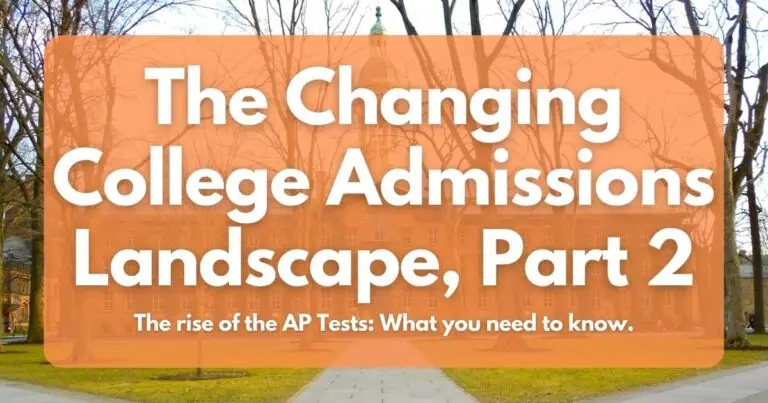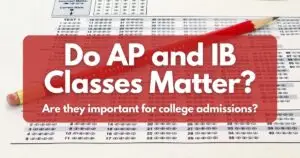College admissions is a long game. Plant the seeds for admissions early! What your kids choose to do in middle and even elementary school matters!
But fear not…planting those seeds doesn’t have to be daunting.
Part 2: The Rise of the AP Tests
Coming soon:
Part III: Teacher Recommendations and Building Relationships
Part IV: Extracurriculars

If you take away one idea from this post, it’s this:
- Take as Many AP Courses as You Can While Maintaining Grades and Mental Health.
- College admission chances increase dramatically with strong AP grades and test scores.
- Strong APs show you’re ready for college-level work.
- APs are one of the best indicator of future college success.
If you like more in depth info, read on:
The Rise of the AP Tests
With the somewhat diminished importance of the SAT and ACT, students need to take APs seriously!
Unlike SAT or ACT (which predominantly test how well you take the SAT and ACT), AP tests reward a year of intense learning at the college level.
Plus, AP scores have always been a stronger indicator of college success than other tests, and colleges know it!
How Do Colleges Use AP Scores?
More than ever, strong AP scores (4s and 5s, and at some schools 3s) are helping kids get into college.
Colleges definitely consider weighted GPAs, with 1 point boosts for AP courses.
To give a little context, 75% of 2020 UCLA admitted students had weighted GPAs of 4.34 or higher, and 25% had GPAs of 4.68 or higher.
Many colleges also use AP scores as they were designed: to give course credit or help place kids in appropriate level classes.
How Many AP Courses Should Kids Take?
This depends on each kid’s ability to handle the increased workload and still maintain good grades and mental health. If 3 AP courses will cause a kid’s GPA to suffer, don’t take that many.
But colleges reward students who take advantage of the opportunities they have.
If a high school only offers 4 AP courses, and a student takes all 4, that student’s application will look better than a student who takes 4, 5 or even 6 AP courses at a school where 15 are offered.
So, it is a good idea to take a many AP courses as a student can reasonably handle while maintaining good grades and most importantly staying mentally healthy.
Do Kids Need to Prep for APs?
Absolutely. Most AP teachers do a pretty good job prepping their students for the AP tests, but everyone can benefit from prepping with their tutor as well to maximize scores.
But equally as important is maintaining strong grades in AP classes, and working with their tutor all year can help kids excel and relieve some worry and stress!
To learn how to maximize chances of admission, be sure to read our next two posts on The Changing College Admissions Landscape.
And as always, Aim Higher!





